 Accueil
Accueil
Catégories
|
Thésaurus CEREQ > LE CADRE SOCIO-ECONOMIQUE > 2030 L'EVOLUTION TECHNOLOGIQUE > MUTATION TECHNOLOGIQUE > INTELLIGENCE ARTIFICIELLE
INTELLIGENCE ARTIFICIELLESynonyme(s)SYSTEME EXPERT |
Documents disponibles dans cette catégorie (205)


 Affiner la recherche
Affiner la recherche
Article : document électronique
Léo Besson ; Arthur Dozias ; Clémence Faivre ; Charlotte Gallezot ; Joceran Gouy-Waz ; Basile Vidalenc |L’intelligence artificielle (IA) est une technologie qui pourrait générer d’importants gains de productivité, encore peu observables au niveau macroéconomique du fait d’une adoption limitée par les entreprises. Ses effets sur l’emploi sont plus [...]
Article : document électronique

Article : document électronique
Pour continuer à construire tout en répondant aux défis de notre temps, il faut constamment innover. Les entreprises du bâtiment et de la construction ont une tradition d’innovation. Qu’il s’agisse de produits, de matériaux, de procédés, de serv[...]
Article : document électronique
ChatGPT fait beaucoup parler, mais que faut-il retenir de ce buzz ? Après un état des lieux, le chercheur Thierry Rayna nous montre ce qui se cache derrière cette véritable boîte noire, non pas une menace sur les emplois qualifiés, mais une nouv[...]
Article : document électronique
Benoît Hervieu-Léger, dir. |L’amour dure sept ans, veut croire l’adage. C’est également l’échéance moyenne d’un désamour professionnel. Le journalisme use de plus en plus vite des carrières embrassées par passion ou vocation. L’attrait pour le métier ne se dément pas, alor[...]
Article : texte imprimé
Les avancées scientifiques et technologiques font régulièrement la une des médias, comme en témoignent, par exemple, les nombreux articles et commentaires autour des progrès de l’intelligence artificielle (IA), en particulier depuis le lancement[...]
document électronique
The rapid expansion of artificial intelligence is unparalleled, establishing it as a ubiquitous element in workplaces and our daily lives. The era when AI was exclusively associated with robots and intricate algorithms for the technically profic[...]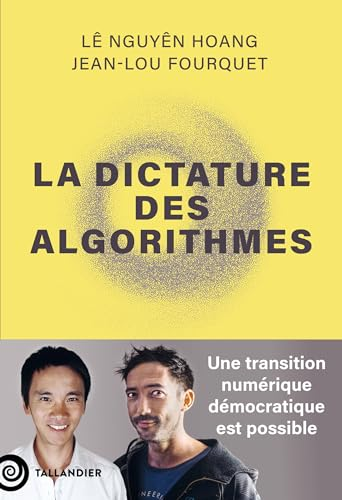
texte imprimé
C’est l’enjeu civilisationnel du siècle. Depuis une décennie, notre attention est sous le contrôle d’algorithmes dangereux pour l’humanité et nous regardons ailleurs. À chaque seconde, des intelligences artificielles ultra sophistiquées choisiss[...]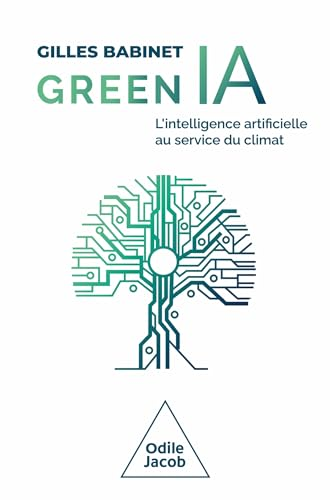
texte imprimé
Et si l’intelligence artificielle (IA), régulièrement dénoncée pour son empreinte carbone croissante, était au contraire la meilleure alliée de la transition environnementale ? Le climat, mais aussi la biodiversité, sont des systèmes complexes, [...]
document électronique
Philippe Aghion ; Anne Bouverot ; Commission de l'intelligence artificielle (Paris) | Paris : Premier ministre | 2024La commission de l'intelligence artificielle a été installée par le Gouvernement, Organe collégial composé du Premier ministre, des ministres et des secrétaires d'État, chargé de l'exécution des lois et de la direction de la politique nationale [...]
Article : document électronique
Cet article expose les compétences essentielles à la gestion de l’intelligence artificielle (IA) dans les organisations en mettant l’accent sur la dimension éthique, mais sans négliger les enjeux d’un point de vue managérial, technique, humain, [...]
Article : document électronique
La perte d'emploi liée à l'émergence de l'intelligence artificielle est devenue un sujet de préoccupation croissant dans le monde du travail. Cette contribution explore les fondements juridiques possibles de la concrétisation de cette fiction de[...]
Article : texte imprimé

Article : document électronique
Cet article présente une recension des écrits sur la façon dont les rôles de l’enseignant et de l’intelligence artificielle (IA) sont abordés dans le domaine de l’intelligence artificielle en éducation (IAED) depuis 1970. Quarante-sept documents[...]
Article : document électronique
Le cahier spécial « Les enjeux économiques, politiques et managériaux de l’innovation responsable » a pour but de mettre en évidence les défis majeurs auxquels le développement de l’innovation responsable est confronté, provenant notamment de la[...]
Article : document électronique
L’intelligence artificielle (IA) représente un défi majeur pour l’innovation responsable (IR) en raison de l’ampleur des transformations sociétales et productives qu’elle induit. L’enjeu de l’inscription de l’IA dans l’innovation responsable ne [...]
Article : document électronique
Suivant une perspective sociologique, cet article propose une vue d’ensemble documentée des questions de racisme et de discriminations en contexte numérique, notamment depuis l’irruption lors de la première décennie du xxie siècle d’une série de[...]
Article : document électronique
Valérie Beaudouin, dir. ; Julia Velkovska, dir. |Face au foisonnement de discours philosophiques, médiatiques et politico-administratifs sur l’« éthique de l’IA », les études empiriques qui examinent sa performativité en contexte et les pratiques sociales qui lui sont associées sont rares. Com[...]
Article : document électronique
Yann Ferguson ; Stéphanie Messal ; Nicolas Blanc, Collaborateur |Les récents progrès de l’intelligence artificielle basée sur des méthodes d’apprentissage ont conduit à la multiplication de machines parlantes dans les environnements de travail. Objectif majeur depuis l’origine de l’ia, faire parler la machine[...]
Article : document électronique
Notre article explore la manière dont l’intelligence artificielle concourt à la dynamique du dialogue social dans l’entreprise. Pour cela, nous avons mené une étude exploratoire auprès d’une banque coopérative et mutualiste. 34 acteurs impliqués[...]
Article : document électronique
La « révolution numérique » actuelle, en rendant l’information disponible en temps réel et les interactions spatiales et sociales beaucoup moins dépendantes de la distance physique, bouleverse-t-elle réellement la façon de vivre, de produire et [...]
Article : document électronique
L’Intelligence Artificielle (IA) constitue un enjeu stratégique au sein des entreprises, permettant d’innover et de proposer de nouveaux usages et services vers les clients. Elle redistribue les tâches, transforme les métiers et amène à repenser[...]
Article : document électronique
L’intelligence artificielle et le métavers contribuent à l’optimisation du système de santé et de la formation du personnel soignant. Mais l’écueil d’un appauvrissement de la culture médicale et les risques économiques rendent un encadrement hum[...]
Article : texte imprimé
Cette contribution part d’une exploration de l’alternative information versus savoirs dans l’usage des outils numériques, et analyse la structure logique des outils numériques les plus habituels et de leur contribution potentielle à la formation[...]
Article : document électronique

Article : document électronique
L’industrie automobile est à la croisée des chemins face au défi de la transition écologique qui génère une complexité inégalée pour la filière.Le secteur des transports (incluant les transports aérien, ferroviaire, maritime, fluvial de marchand[...]
Article : document électronique
Cet article met en avant les évolutions de la recherche francophone portant sur l’utilisation des technologies dans les apprentissages et la formation des adultes, de 2003 à 2022. Un corpus constitué des titres, résumés et mots clés de 748 docum[...]
Article : document électronique
Lionel Roche, dir. ; Judicaël Alladatin, dir. ; Florian Meyer, dir. |La question du recours au numérique en éducation en Afrique ne constitue pas une préoccupation nouvelle. Le numérique semble aujourd’hui omniprésent, conduisant certains à parler d’un véritable tsunami numérique, voire de révolution numérique. N[...]
Article : document électronique
Responsable de la mise en œuvre de l’open data des décisions de justice, la Cour de Cassation développe, depuis 2018, un algorithme d’intelligence artificielle de pseudonymisation automatique de la jurisprudence. À partir d’une enquête ethnograp[...]
Article : texte imprimé
Le lancement, fin novembre 2022, de ChatGPT, un agent conversationnel développé par OpenAI, a fait grand bruit et suscité nombre de reportages et commentaires sur les performances et avancées de l’intelligence artificielle (IA). Pour autant, si [...]
Article : document électronique
Suite à la publication du livre blanc pour une approche de l’IA basée sur l’excellence et la confiance, la Commission Européenne (CE) a publié de nombreuses propositions de textes réglementaires dont un AI Act (CE, 2021) établissant des règles h[...]
document électronique
Zeineddine Khelfaoui | 2023Pendant longtemps l’organisation du travail dans les entreprises était vu par le prisme des prescriptions, de l’ordonnancement technique et scientifique et des formes plus ou moins simples des hiérarchies fonctionnelles et pyramidales. Ces organ[...]
document électronique
ADEME - Agence de la transition écologique (Paris) ; ARCEP - Autorité de Régulation des Communications électroniques et des Postes (Paris) (Paris) | Paris : Ademe | 2023La dernière décennie a vu s'accélérer l'essor de nouvelles technologies qui ont marqué le paysage de leur apport en rapidité, qualité et connectivité pour les contenus multimédias et les outils de communication. Alors que de nombreux domaines d'[...]
document électronique
CEDEFOP - European Centre for the Development of Vocational Training | Thessalonique : CEDEFOP | Policy briefs | 2023This policy brief sheds new light on the evolving landscape of digital skill requirements in the EU-27, using Cedefop analysis of online job advertisements. The evidence in this policy brief showcases the pivotal role of digital skills in econom[...]
document électronique
Publicly available generative AI (GenAI) tools are rapidly emerging, and the release of iterative versions is outpacing the adaptation of national regulatory frameworks. The absence of national regulations on GenAI in most countries leaves the d[...]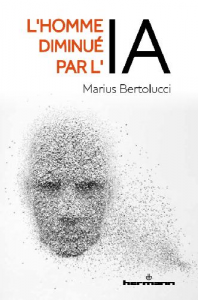
texte imprimé
L’intelligence artificielle derrière nos écrans est devenue omniprésente. Ses capacités progressent à un rythme exponentiel dans des domaines que l’on croyait autrefois réservés aux humains, comme l’art, le langage, les relations interpersonnell[...]
document électronique
Ce livre blanc a été produit par un groupe de travail du collectif Impact AI en partenariat avec l’association EdTech France. Son objectif est de donner un éclairage de l’apport que peut avoir maintenant et dans le futur l’intelligence artificie[...]
document électronique
Karine Gentelet, dir. | Québec [Canada] : Presses de l'Université de Laval - PUL | Éthique, IA et société - OBVIA | 2023Cet ouvrage vient clôturer deux années de réflexion intensive sur les enjeux à l’intersection entre la justice sociale et les technologies d’IA. Une compréhension de ces impacts sociétaux dépasse alors l’aspect technique pour se concentrer princ[...]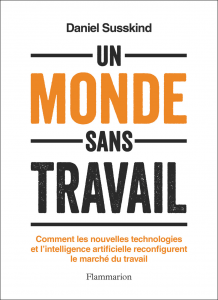
texte imprimé
Quel est l'avenir du travail au XXIe siècle ? Cette question se heurte à un paradoxe fondamental : les avancées technologiques vont nous rendre plus riches que jamais, mais elles empiètent toujours plus sur le travail tel que nous le connaissons[...]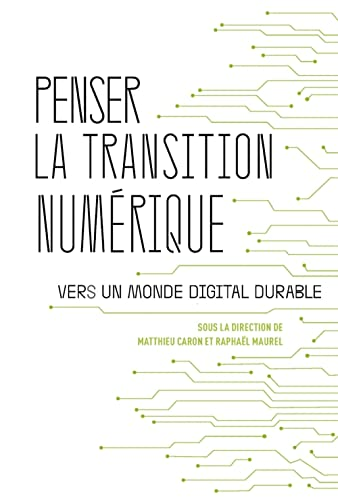
texte imprimé
Le numérique a envahi nos vies. Et pourtant, la transition vers une société numérique est loin d’être achevée ! Or nous sommes loin de mesurer les nombreuses conséquences de l’arrivée massive du numérique dans nos vies. Cette transition se fait [...]
document électronique
Le rôle et la place du médecin généraliste doivent évoluer vers une prise en charge globale des patients. L’usage des moyens diagnostiques et thérapeutiques numérisés et le partage des tâches dans une étroite collaboration avec les autres person[...]
document électronique
CFE-CGC - Confédération Française de l'Encadrement (Paris) | Noisy-le-Grand : IRES | Rapport | 2023Le projet SECOIA DEAL, piloté par la CFE-CGC en collaboration avec ses partenaires (IRES, Astrées, CIDA et U2P) auxquels se sont associés (la CEC European Managers, l’ONG AlgorithmWatch, la Fondation Brodolini, l’organisation Ledarna) a constitu[...]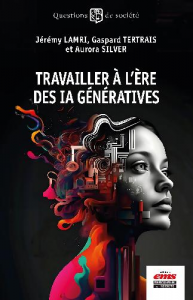
texte imprimé
Jérémy Lamri ; Gaspard Tertrais ; Aurora Silver | Cormelles-le-Royal : EMS - Editions Management et Société | Questions de société | 2023L'ouvrage explore comment les technologies de l'intelligence artificielle (IA) génératives vont révolutionner le monde du travail et la société. Les auteurs explorent l'histoire et le potentiel des IA génératives pour créer des possibilités infi[...]
document électronique
Jean Condé ; Yann Ferguson ; INRIA - Institut national de recherche en sciences et technologies du numérique (Rocquencourt) ; France. Ministère du Travail, de l'Emploi et de l'Insertion (Paris) ; Institut Matrice (Paris) | France : LaborIA | 2023Analyser les impacts de l’intelligence artificielle (IA) sur le travail, les travailleurs, l’emploi et les compétences : voici l’objectif du LaborIA, un laboratoire de recherche dédiée à l’intelligence artificielle, crée par le ministère du Trav[...]
Article : document électronique
With the development of artificial intelligence (AI) and its applications, such as learning algorithms, it seems likely that work and organization will be profoundly reshaped. While this subject has been debated in broad terms (Arntz et al., 201[...]
Article : document électronique
Cet article a tenté de montrer comment la dignité humaine peut agir comme une limite et une contrainte juridique dans la décision de déléguer (ou non) une tâche à un outil d’IA, afin de faciliter le respect des droits de l’homme. Dans un context[...]
Article : document électronique
« Les MOOC représentent une formidable opportunité de transformation positive et radicale du secteur de l’éducation »… telle était en substance la croyance la plus répandue autour des MOOC lorsqu’ils ont été popularisés en 2012 avec la création [...]
Article : texte imprimé

Article : document électronique
Dans quelle mesure les nouveaux métiers du numérique appellent-ils des adaptations managériales ? 20 entretiens menés auprès de designers User eXperience (UX) révèlent les spécificités du métier aux couleurs de la formation, de la carrière, de l[...]
Article : document électronique
L'intelligence artificielle (IA) est de plus en plus présente dans toutes les sphères de la société. Elle est d’ailleurs sur le point de bouleverser radicalement les milieux de travail et la vie quotidienne. Cette évolution imminente suscite cep[...]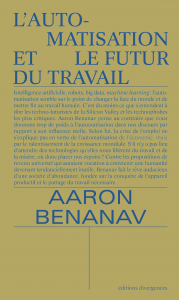
texte imprimé
Intelligence artificielle, robots, big data, machine learning : l’automatisation semble sur le point de changer la face du monde et de mettre fin au travail humain. C’est du moins ce que s’entendent à dire les techno-futuristes de la Silicon Va[...]
document électronique
Lydie Chaintreuil ; Pauline Gay-Fragneaud ; Jérémy Yorillo, Collaborateur | 2022Comment l’intelligence artificielle se met-elle au service de l’outillage emploi-formation ? Comment les acteurs de l’emploi-formation s’emparent-ils des nouvelles technologies pour améliorer la connaissance du champ ? Dans un contexte d’évoluti[...]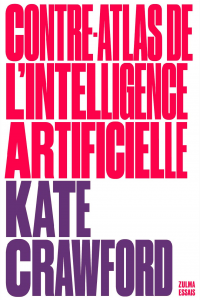
texte imprimé
Où et comment l’intelligence artificielle est-elle fabriquée ? Qui la finance et qui sert-elle ? À travers une série d’enquêtes approfondies, Kate Crawford déploie une cartographie exhaustive de l’IA : ses coûts et ses impacts environnementaux, [...]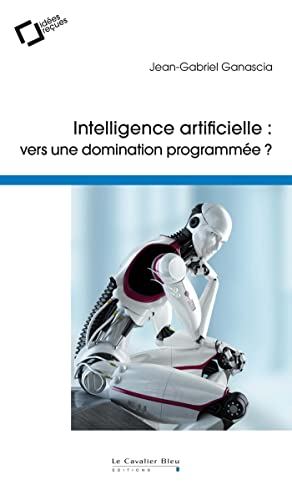
texte imprimé
Aujourd'hui, les ordinateurs sont présents dans toutes nos activités quotidiennes. Une machine a vaincu le champion du monde du jeu de go, on construit automatiquement des connaissances à partir d'immenses masses de données (Big Data), des autom[...]
Article : document électronique
Jérémie Giniaux-Kats ; Erik Campanini ; Mathias Dufour ; Florian Forestier ; Pauline Maury ; Sylvie Teynier |Pour recruter et gérer la main-d’œuvre, et organiser le travail, le management algorithmique fait des merveilles. Il comporte toutefois son lot de risques pour les salariés. Il y a urgence à en comprendre les enjeux et à le réguler.
Article : document électronique
L’IA est en train d’envahir tous les espaces et territoires de notre vie, et ce dans tous les secteurs (automobile, hospitalier, militaire, sociétal, etc. (De Ganay et Gillot, 2017). Elle pourrait devenir l’objet de tous les pouvoirs et en parti[...]
Article : document électronique
Véronique Dutraive, dir. ; Richard Arena, dir. ; Jean-Pierre Benghozi, dir. ; Thierry Burger-Helmchen, dir. |La créativité relève-t-elle des questions économiques ? Si le thème fait l’objet de ce numéro spécial de la Revue d’économie industrielle, c’est justement que la notion apparaît aujourd’hui de plus en plus présente dans les récentes réflexions q[...]
Article : texte imprimé
Using detailed data on skill requirements in online vacancies, we estimate the demand for AI specialists across occupations, sectors, and firms. We document a dramatic increase in the demand for AI skills over 2010–2019 in the U.S. economy acros[...]
Article : document électronique

Article : document électronique
Préparer la défense de demain, c’est réfléchir aux conflits du futur, concevoir les équipements avec des programmes pouvant atteindre le demi-siècle, mais surtout recruter, former et préparer les soldats qui, demain, assureront la défense des in[...]
Article : document électronique
Rapide, puissant, systématique : la liste des vertus des algorithmes pourrait s'allonger encore. Là où les affects humains peuvent conduire à des décisions contingentes, irrationnelles, l'algorithme brille par sa constance et son systématisme. I[...]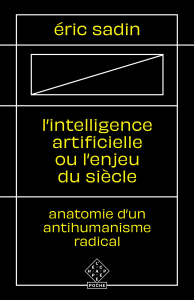
texte imprimé
L’intelligence artificielle se dresse comme une puissance habilitée à expertiser le réel de façon plus fiable que nous-mêmes. Elle est appelée à orienter la conduite des affaires humaines, entraînant ainsi l’éradication des principes juridico-po[...]
document électronique
How might digital technology and notably smart technologies based on artificial intelligence (AI), learning analytics, robotics, and others transform education? This book explores such question. It focuses on how smart technologies currently cha[...]
Article : texte imprimé
Edmond Baranes ; Jean-Luc Sauron ; Mathilde Hoang ; Henri Isaac ; Marc Bourreau ; Guillaume Thébaudin ; Stephan Clémençon ; Amandine Lévêque |Ce dossier porte sur les données numériques, leur production, leur utilisation et leur contrôle. Les auteurs analysent les principaux aspects des multiples enjeux : économiques, politiques, démocratiques… En effet, L’accumulation massive de ces [...]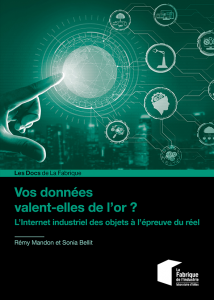
texte imprimé
Et si les machines ou les lignes de production d’une usine pouvaient « parler » en émettant des données ? C’est l’une des promesses de l’Internet industriel des objets. Car l’IIoT fait appel à un continuum de technologies : depuis des capteurs p[...]
Article : document électronique
Reconnaissance faciale, pression des doigts sur le clavier, enregistrement de l’humeur… Les logiciels d’intelligence artificielle sont en train de transformer l’emploi. Censés mieux répartir les charges de travail, ils court-circuitent les syndi[...]
Article : texte imprimé

Article : document électronique

Article : document électronique
Salima Benhamou ; Workshop ‘Transformative Technologies: The Impact of Industry 4.0 on Employment, Global Value Chains and Sustainable Development’ (June 2019; Université Côte d’Azur) |This article analyses how artificial intelligence (AI) can transform work, considering both the potential of this technology and its limits. The sectoral approach adopted, focusing on the health, transport and banking sectors, allows for a detai[...]
Article : document électronique

Article : document électronique
Cet article reconstitue le récit de l’« organisation augmentée » par l’intelligence artificielle et en propose une lecture critique à l’aune du concept d’emprise. Partant d’un travail d’anthropologie documentaire regroupant une littérature inter[...]
Article : document électronique
Depuis quelques années, l’Intelligence Artificielle (IA) connaît un regain d’intérêt sans précédent grâce à d’importantes avancées technologiques, notamment dans le domaine de l’apprentissage machine (machine learning), qui étendent les capacité[...]
Article : document électronique
Cet article relate une expérience de participation de chercheures en ergonomie à un projet de recherche de développement d’un démonstrateur de robotique collaborative. Cette contribution empirique est mise en perspective avec des éléments théori[...]
Article : document électronique
Pour soulager ses recruteurs, submergés par le nombre des candidatures, L’Oréal s’est tourné vers l’intelligence artificielle afin de mettre en œuvre des solutions RH originales, en choisissant une approche à la fois ambitieuse et précautionneuse.
Article : document électronique
Les inquiétudes suscitées par le chômage technologique ne datent pas d'aujourd'hui. Dans les années 1960, les débats sur l'automatisation reflétaient aussi bien l'optimisme que les préoccupations engendrées par le potentiel de destruction d'empl[...]
document électronique
The objective of this report is to present and gather information on all EU Member States' national AI strategies in a structured and comprehensive way. It aims to help Member States to compare their strategy and to identify areas for strengthen[...]
document électronique
Massimo Craglia ; Sarah De Nigris ; Emilio Gomez-Gonzales ; et alii | Luxembourg : Publications Office of the European Union | 2020The COVID-19 pandemic has created an extraordinary medical, economic and social emergency. To contain the spread of the virus, many countries adopted a lock down policy closing schools and business and keeping people at home for several weeks. T[...]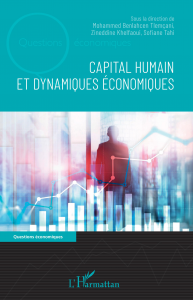
texte imprimé
Mohammed Benlahcen Tlemçani, dir. ; Zeineddine Khelfaoui, dir. ; Sofiane Tahi, dir. | Paris : L'Harmattan | Questions économiques | 2020Les deux dernières décennies ont connu des changements majeurs en matière de développement au niveau mondial. Ainsi, les spécialistes du développement ont déplacé leur centre d'intérêt, axé jusqu'alors sur des modèles "standards" , vers des modè[...]
document électronique
Dans un livre blanc intitulé « Éducation et Numérique : enjeux et défis », Inria dresse un état des lieux de l'impact du numérique comme vecteur de transformation éducative avant d’apporter sa contribution sous forme de propositions répondant au[...]
document électronique
Les apports de l’intelligence artificielle dans le domaine des RH et du recrutement sont notables dans la recherche d’emploi, l’analyse des CV, le sourcing ou encore la présélection des candidat·e·s en fonction du profil recherché. Toutefois, de[...]
document électronique
Innovation and digitalisation in Vocational Education and Training (VET) play a key role in wider green and digital transitions, as well as in the recovery and resilience of a post COVID-19 Europe. Through workshops, webinars and Peer Learning [...]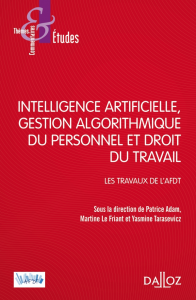
texte imprimé
Patrice Adam, dir. ; Martine Le Friant, dir. ; Yasmine Tarasewicz, dir. | Paris : Dalloz | Thèmes et commentaires | 2020L'intelligence artificielle (IA) modifie, imprègne, modèle le monde. À cette révolution, l'entreprise n'échappe pas. Elle en est même l'un des principaux lieux. Et si l'IA s'intègre déjà , de différentes manières et à différents niveaux, dans le [...]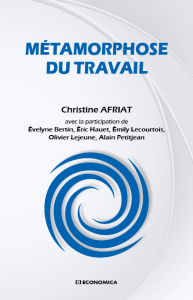
texte imprimé
Intelligence artificielle, robotique, impression 3D, industrie 4.0, objets connectés, blockchain sont quelques-unes des menaces que l’évolution technologique fait peser sur les emplois existants. Au-delà des possibles pertes d’emploi, c’est l’en[...]
texte imprimé
Nos sociétés érigent en idéal la capacité d'agir, celle de l'individu libre et autonome. Pourtant, de tout le corps social montent des exaspérations, revendications ou souffrances de la part de vies empêchées, à mille lieux de cet idéal d'accomp[...]
document électronique
Bettina Laville ; Ghislaine Hierso ; Geoffroy de Vienne ; Plateforme RSE (Paris) ; France stratégie (Paris) | Paris : France Stratégie | Avis | 2020Dans un avis adopté le 6 juillet 2020, la Plateforme RSE propose une définition de la responsabilité numérique des entreprises, formule un diagnostic sur l’enjeu des données et adresse 34 recommandations à l’attention des différentes parties pre[...]
document électronique
In recent years, the increasing concern about the labour market implications of technological change has led economists to look in more detail at the structure of work content and job tasks. Incorporating insights from other traditions of task a[...]
document électronique
The COVID-19 crisis has strongly affected Europe’s labor markets, and it may take years for employment to return to its pre-crisis levels. But the pandemic will not be the only trend shaping the future of work on the continent. This research tak[...]
document électronique
Marco Barzman, dir. ; Mélanie Gerphagnon, dir. ; Olivier Mora, dir. | Versailles : Quae | Matière à débattre et décider | 2020Plateformes, réseaux sociaux, ressources en ligne, simulations, apprentissage à distance, données d’apprentissage, données massives, intelligence artificielle… la transition numérique bouleverse l’enseignement supérieur et la recherche publics. [...]
document électronique
The development of digital, automation and artificial intelligence (AI) technologies in work organisations has emerged as a major issue in French public debate. […] Compared to other European countries, France appears particularly attractive f[...]
Article : document électronique
Dans cet article, nous défendons l’idée que les effets de l’intelligence artificielle (IA) et de l’automatisation sur la croissance et l’emploi dépendent pour une large part des institutions et des politiques. Notre analyse s’articule en deux te[...]
Article : document électronique
Médecine, biologie, économie, finance, sociologie, sport, les domaines à mobiliser l’apprentissage machine sont de plus en plus nombreux. Si leur intérêt n’a cessé de s’intensifier ces dernières années, c’est qu’ils ont préféré percevoir les mét[...]
Article : texte imprimé
Après un premier dossier « Cerveau et apprentissages » (n° 428), suivi d’un deuxième opus consacré à la plasticité du cerveau (n° 431), Futuribles ouvre un troisième volet dans la série « Cerveau », portant cette fois sur les interactions homme [...]
Article : document électronique
Cet article présente les résultats d’une étude qualitative exploratoire menée auprès d’un organisme de formation confronté à des résistances de ses parties prenantes à un projet d’innovation par l’intelligence artificielle (IA) impulsé dans une [...]
Article : document électronique
On assiste depuis une dizaine d’années à une prolifération des structures d’incubation. Le droit n’a pas échappé à cette tendance avec la création par des avocats de l’Incubateur du Barreau de Paris. Ce dispositif original d’accompagnement vise [...]
Article : document électronique
Julien Damon, dir. |L'intelligence artificielle fait à la fois peur et rêver. Elle pénètre dans la production du bâtiment, dans la vie du bâtiment et dans les entreprises du bâtiment. Cette nouvelle phase de la révolution numérique imprègne toute la filière. Avec l[...]







